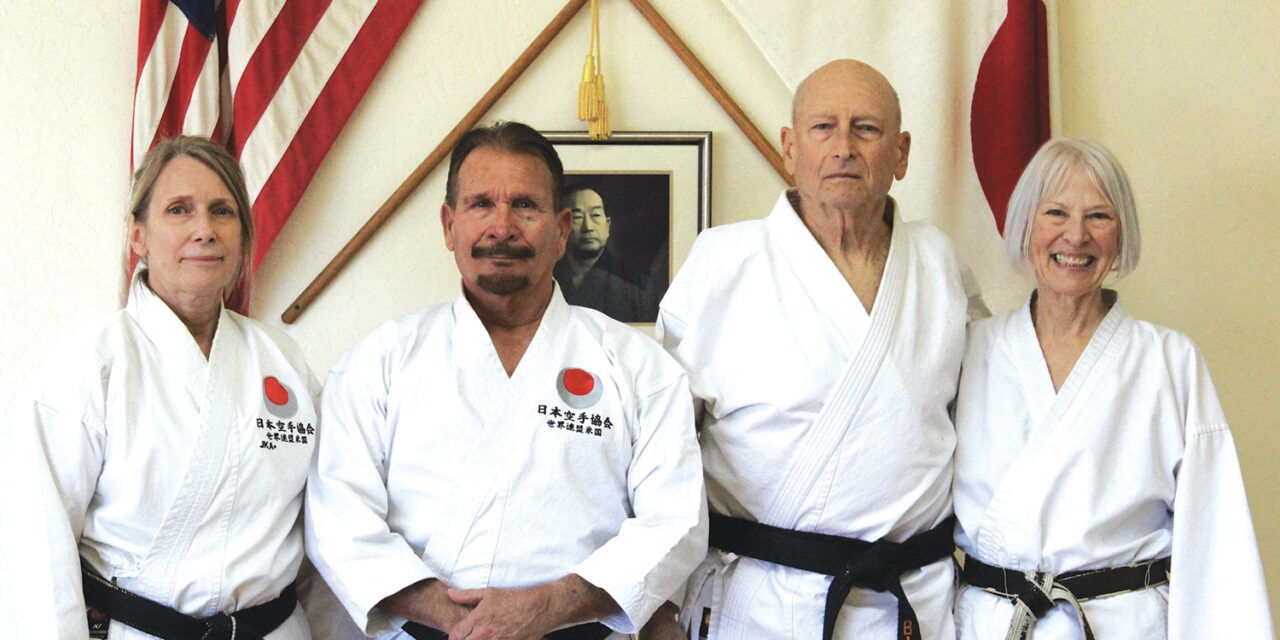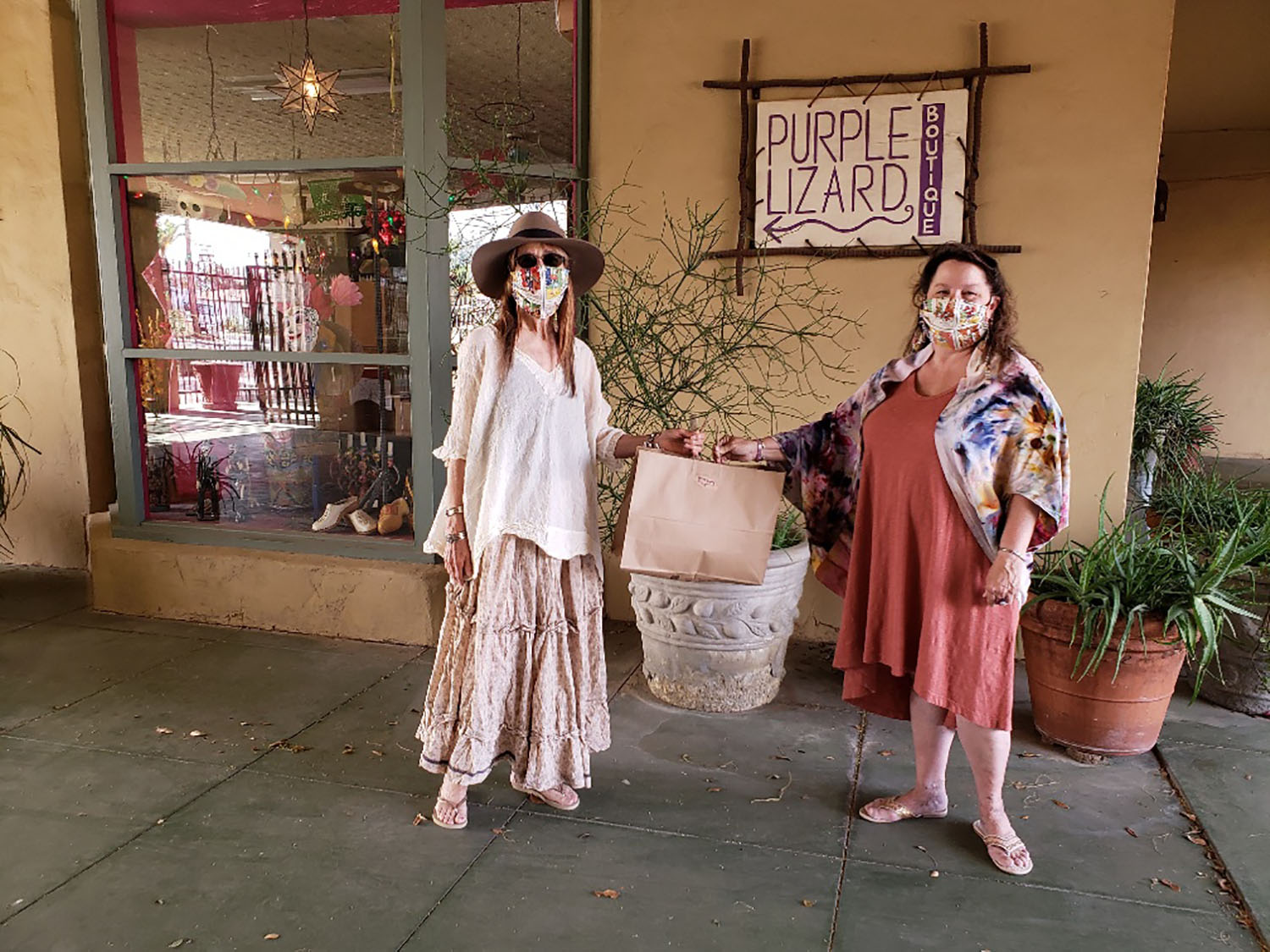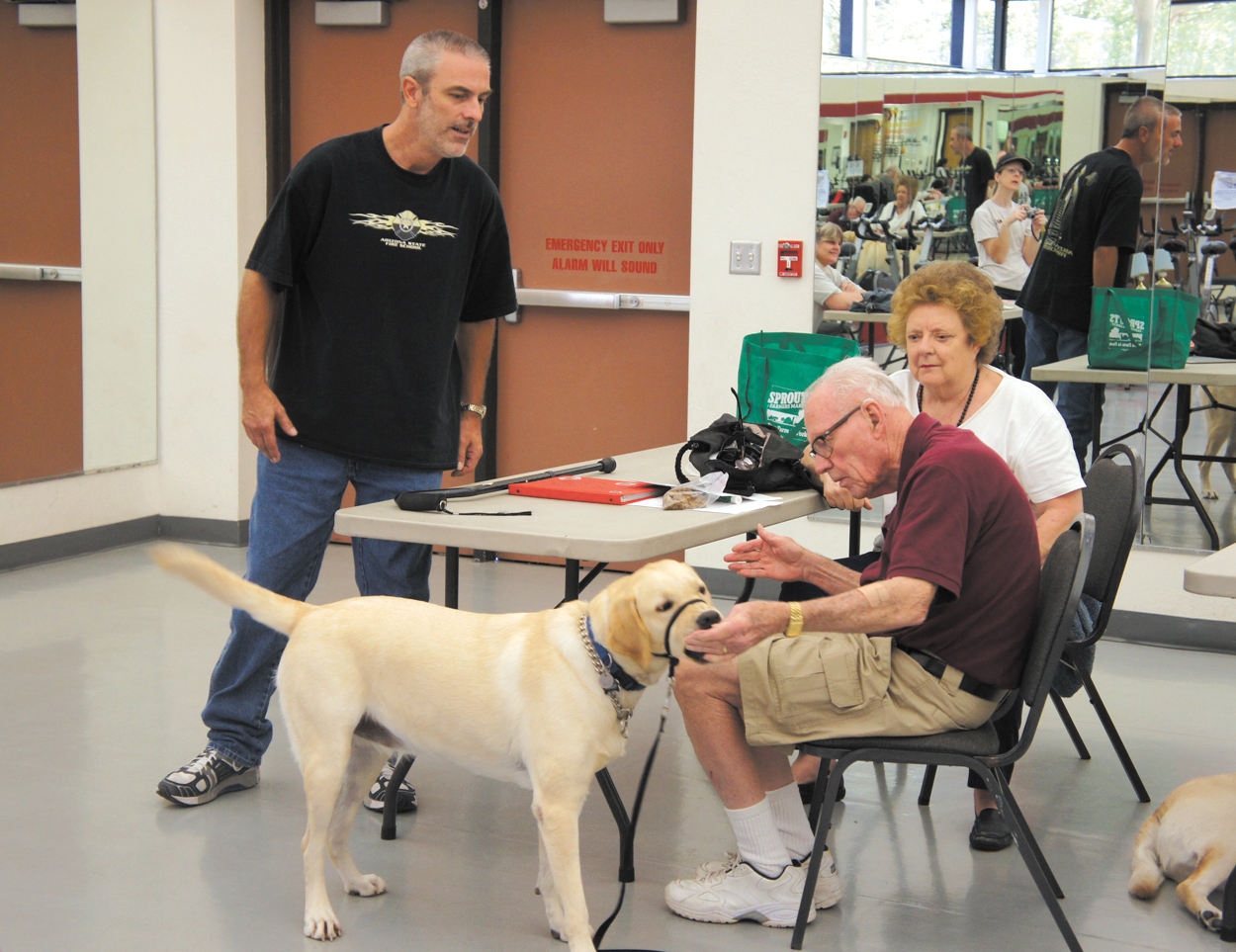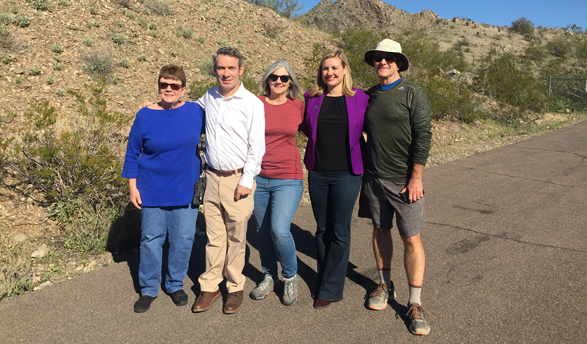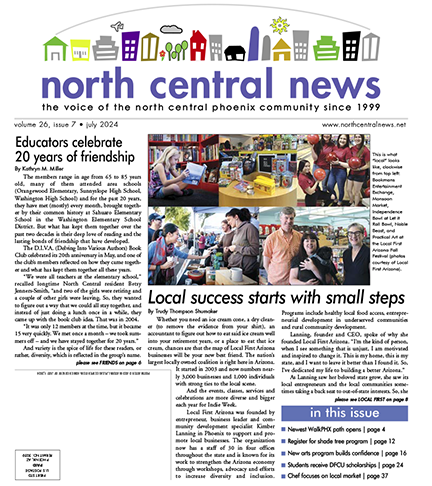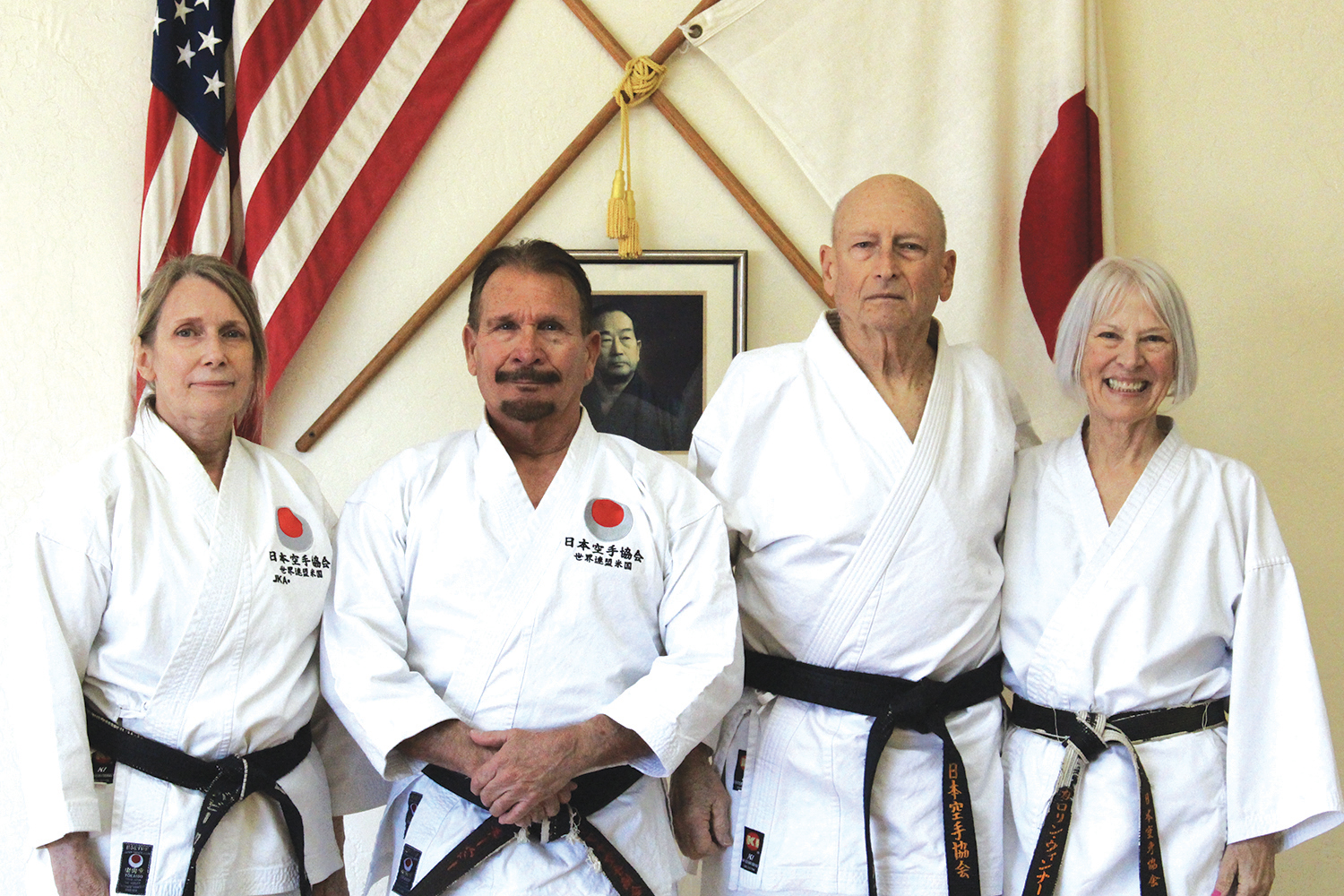
Pictured, R-L, are Bobby and Joe Quihuis, instructors and members of the Arizona JKA board, and Art and Lyn Weiner, members of the dojo since the 70s (photo by Kathryn M. Miller).
Love can be found in the most unexpected places, but for members of the Arizona JKA Shotokan Karate dojo, love, in all its forms, seems to come with the territory.
On the wall of the dojo are its five guiding principles: Seek Perfection of Character; Be Faithful; Endeavor to Excel; Respect Others; Refrain from Violent Behavior. These principles, the Dōjō kun, are recited during the closing ceremony of each class, and members of the dojo carry them into their everyday lives. Is it any wonder, then, that a dozen or so members have not only found love, but longevity in those relationships?
As with many things that stand the test of time, this story begins with a good foundation. Originally founded in December 1961 at 28th Street and Thomas by Gary and Joan Abbott, in 1964, under the direction of the International Japan Karate Association (JKA), the owners helped bring Sensei Shojiro Koyama from Japan to the Valley. That same year, the dojo moved to its current location at 7th Street and Maryland Avenue.
When Sensei Koyama retired in 2017, there was no immediate successor. To keep the doors open, management of the dojo was assumed by a board of senior students with instructor credentials. Now operating as a nonprofit, the dojo has sustained the Sensei’s teachings, in heart and spirit, even after his death in 2021.
On a January morning some 60 years after the dojo first opened, four longtime members, Bobby Quihuis and her husband, Joe, both instructors and 5th and 4th degree black belts, respectively, and Lyn Weiner and her husband, Art, also black belts, talked about longevity, continuity, the lessons of their Sensei and why others might enjoy karate. Their ages range from late 60s to closing in on 80 and all have trained at the dojo for three or four decades — they also all met there and subsequently married.
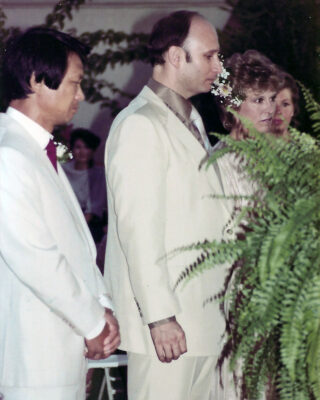
Sensei Shojiro Koyama served as best man at Art and Lyn Weiner’s wedding (photo courtesy of the Weiner family).
JKA’s three dozen members are anywhere from age 5 to 79, and it is not uncommon for multiple generations to train at the dojo, they said. Many friendships have been forged over the years, and there have been at least six marriages. And longevity? The Quihuis’ will celebrate their 47th anniversary later this year and the Weiners have been married for 40 years.
Both couples point to karate and their dojo specifically for those strong relationships.
“It does form a very strong basis of activity in our relationship,” Lyn said. “It’s kind of the rhythm section.”
Bobby agreed, “You have common interests. You have common friends. And just the diversity of the dojo is something that I think the whole world could learn from. With people from different religions, different ethnicities, different backgrounds, different political affiliation…none of that is important because everybody has a common interest. They’re training for karate.”
And key to that training are the concepts of the “Dōjō kun,” which are reinforced at the dojo and translate beyond its doors.
“It’s not just how you act on the floor, but what you’re trying to incorporate in your daily life,” Bobby said.
“Usually, when people think of martial arts, they think of kicks, you know flying kicks and stuff. But for us, it is lifetime training,” she added.
“My 78-year-old-self is extremely grateful to my 33-year-old self because it provides mental and physical energy,” Lyn interjected.
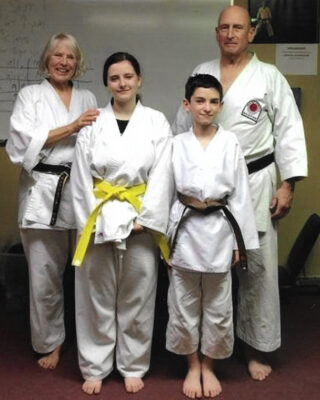
Lyn and Art Weiner’s grandchildren have followed in their grandparent’s footsteps at JKA (photo courtesy of the Weiner family).
“And it’s a nice family activity,” Bobby continued. “We have multiple instructors in the class, that way we can kind of break it up, separate the children, but it’s a common activity that you’re doing with your family without really focusing on your family.”
Art agreed, and related a story about the founders’ daughter, Kimi, who grew up in the dojo, now teaches the kids’ class and brought her granddaughter to a recent dojo gathering.
“It just blew me away to see that continuity of generations,” Art said.
Karate is also a great way to create focus in your day, Bobby said. She has seen adults find stress relief and concentration, and kids who may be on the fidgety side find calm, and if they are shy or quiet, it brings them out of their shell.
“You come here, you’re breathing, you’re stretching, you’re focusing on the techniques, and you forget about work, you forget about stress. There’s no phones out there. So, it’s a chance to just kind of recenter yourself.”
Art added, “You show up here with baggage from your day; you leave your baggage outside of the door when you train. When you get finished training and you leave, your baggage is gone.”
And all four say that despite their decades of experience, they are still learning — every day.
“Above all, our Sensei used to say that it was a lifetime exercise,” Joe said. “But it is also an art. It is not just a sport; it’s not a weekend thing. I think people, once they experience that, they will stay for a little while.”
He continued, “It doesn’t require that somebody be massively strong or even particularly coordinated, you can develop these things. As you get older, you start to get the philosophy behind karate. Now that I’ve been here for a long time, 45 years…it’s not about the time, it’s the process. It’s about the journey.”
Residents who are interested in learning more about this North Central dojo can see its members in action at Arizona Matsuri festival, Feb. 24-25 at Steele Indian School Park. Or go online and sign up for an introductory class. Arizona JKA karate dojo is located at 6326 N. 7th St. Learn more at www.arizonajka.org.

